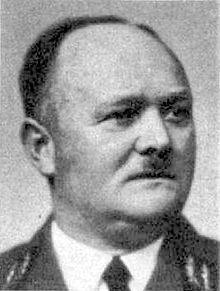Karl Weinrich

Karl Otto Paul Weinrich (born December 2, 1887 in Molmeck , † July 22, 1973 in Hausen ) was a German politician ( NSDAP ). He was NSDAP Gauleiter of Kurhessen , member of the Reichstag , local politician and Obergruppenführer of the NSKK .
Life
Weinrich was the son of a shoe manufacturer. After attending elementary school and mountain technical school, Weinrich joined the Prussian army in 1906 , where he worked in administration. During the First World War he was employed in an army provisions office in the Reich. After the war, Weinrich worked in the Reichsverpflegungsamt from 1920 , first in Cologne and from 1920 in Landau in the Palatinate , where he also became a member of the German National Protection and Defense Association .
In February 1922 Weinrich joined the NSDAP and founded local groups for the party in the Landau area and later in Kassel. After the NSDAP ban was lifted, he rejoined the party in 1925 ( membership number 24.291). From 1925 to 1927 he was deputy Gauleiter and Gaukassenwart of the NSDAP, from 13 September 1928 to November 1943 Gauleiter von Kurhessen ( named Gau Hessen-Nassau-Nord until the end of 1933 ). Deputy Gauleiter was Max Solbrig . From 1929 to 1933 he was a city councilor in Kassel. From October 14, 1930 to 1933 he was a member of the Prussian state parliament , most recently as a member of the board of directors. He was also a member of the Hessen-Nassau Provincial Parliament and the Kassel Municipal Parliament . In 1933/34 he was the representative of the Hesse-Nassau Province in the Reichsrat. From July 1933 to 1945 he was a Prussian State Councilor. From November 12, 1933 to 1945 he was a member of the National Socialist Reichstag for constituency 19 (Hessen-Nassau). Within the NSKK (Motor Obergruppe West) he reached the rank of Obergruppenführer on January 30, 1939. He was awarded the golden party badge , the service award of the NSDAP in gold and the traditional Gau badge. Since it was founded in 1942, Weinrich was the patron of the Brothers Grimm Society in Kassel in his role as Gauleiter . In 1940, at the suggestion of Rector Theodor Mayer, he was made an honorary senator of the University of Marburg for political reasons in order to demonstrate the “integration of the university with the intellectual life of the German people” and the “attitude towards the goals and tasks of the NSDAP”. Weinrich refused the honor on the instructions of the party because honors of this kind were considered undesirable for high party officials. In 1939, on the occasion of the 15th anniversary of the NSDAP local group Fulda, he was given honorary citizenship of the city.
In 1940 and 1941 he successfully dissolved important monasteries (Franciscan monastery Frauenberg zu Fulda and Oblatenkloster zu Hünfeld). The valuable libraries came to Berlin and the Hünfeld Monastery was rededicated as a Napola . For his birthday in 1941, he wanted to give the Fiihrer a convent-free Gau Kurhessen.
From September 1939 he was a member of the Defense Committee of Military District IX. From November 1940 he was also Gau Housing Commissioner and from November 1942 Reich Defense Commissioner in the Gau Kurhessen. Shortly after the air raid on Kassel on October 22, 1943 , which destroyed the entire city center, Weinrich was initially on leave in November 1943 and removed from his post as Gauleiter in 1944. The leadership of the NSDAP, including Joseph Goebbels , charged him with failing in Kassel's war preparations and during the bombing. His successor was Karl Gerland . Because of his "services" to the party, Weinrich was compensated with a farm and worked as a farmer.
After the Second World War he was interned in the Eselheide internment camp from 1945 to 1950 . On July 6, 1949, Weinrich was sentenced to ten years imprisonment by the Kassel Chamber of Justice as one of the main culprits of the National Socialist regime (later reduced to six or seven years, sources differ); in November 1950 he was released from internment as the time he had served in custody was taken into account. From Kassel he moved to Trendelburg , then to Hausen near Offenbach and finally back to Kassel at the beginning of the 1960s.
literature
- Jochen Lengemann : MdL Hessen. 1808-1996. Biographical index (= political and parliamentary history of the state of Hesse. Vol. 14 = publications of the Historical Commission for Hesse. Vol. 48, 7). Elwert, Marburg 1996, ISBN 3-7708-1071-6 .
Web links
- Karl Weinrich in the database of members of the Reichstag
- Entry on Karl Weinrich in the Rhineland-Palatinate personal database
- Weinrich, Karl Otto Paul. Hessian biography. (As of July 28, 2019). In: Landesgeschichtliches Informationssystem Hessen (LAGIS).
- Thomas Schattner: Goebbels: "The good Weinrich is not a lamp" - 80 years ago Karl Weinrich became Gauleiter of the NSDAP in Kurhessen. , Breitenau Memorial, circular no.26, March 2007 (PDF; 293 kB)
Individual evidence
- ^ List of honorary senators of the University of Marburg
- ↑ Udo Engbring-Romang: Seizure of power, securing power, opposition, resistance and persecution (1933-1945) in Wolfgang Hamberger , Thomas Heiler , Werner Kirchhoff : Geschichte der Stadt Fulda (Volume 2) , 2008, Parzeller Buchverlag Fulda, ISBN 978-3- 7900-0398-7 , pp. 137/138
| personal data | |
|---|---|
| SURNAME | Weinrich, Karl |
| ALTERNATIVE NAMES | Weinrich, Karl Otto Paul (full name) |
| BRIEF DESCRIPTION | German politician (NSDAP), MdR, MdL, Gauleiter of Kurhessen |
| DATE OF BIRTH | December 2, 1887 |
| PLACE OF BIRTH | Hettstedt-Molmeck |
| DATE OF DEATH | July 22, 1973 |
| Place of death | Hausen , Hesse |
